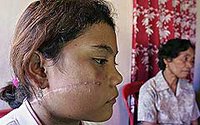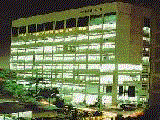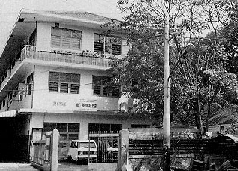 POSO: A thick scar running from the back of her neck to just under her right eye, the lone survivor of a machete attack in which three Christian girls were beheaded on the Indonesian island of Sulawesi has spoken for the first time of her terror.
POSO: A thick scar running from the back of her neck to just under her right eye, the lone survivor of a machete attack in which three Christian girls were beheaded on the Indonesian island of Sulawesi has spoken for the first time of her terror. "All I could do was pray to Jesus for his help," said 16-year-old Noviana Malewa, who fled the October attack with a gaping head wound. "I was streaming with blood."
Noviana, who now lives under police guard in the Christian town of Tentena, described how the girls were taking a short cut to school through jungle and plantations when they ran into at least five masked, black-clad men. Within seconds, three of the teenagers were beheaded -- fresh victims of violence that has turned the Indonesian island into yet another front in the conflict with terrorists.
As Noviana fled bleeding, the assailants collected her friends' heads, put them in black plastic bags and then dumped them in Christian parts of the small town of Poso, one on a porch, the other two on the street.
"They were killed as if they were chickens," said Hernius Morangki, showing a journalist the spot where his daughter was decapitated. "I keep asking myself: What were my daughter's sins?"
Muslim militants are blamed for the beheadings, the most gruesome yet in a campaign of terror against Christians on Sulawesi.
Muslim-Christian violence killed almost 1000 people on Sulawesi between 2000 and 2002 and attracted Muslim militants from across Indonesia, among them members of the terror group Jemaah Islamiah.
Despite a peace deal, bombings, shootings and other attacks on Christians have continued, especially around Poso.
Former fighters and security officials say the latest attacks are carried out by Muslim islanders bent on avenging their dead from the earlier conflict, and terrorists aiming to foment a new war.
"They want to see Poso become alive with the spirit of jihad again," said Fahirin Ibnu Achmad, an Afghan-trained militant who took part in the 2000-02 war. "It is easy to recruit people who have seen their relatives slaughtered," he said, claiming to have renounced violence after spells in prison for gun-running and taking part in an attack on a Christian village.
Sulawesi is one of several islands in what some call Southeast Asia's "triangle of terror" -- a porous region encompassing the insurgency-racked southern Philippines in the north and the Maluku archipelago, itself the scene of sectarian conflict, to the west. Also nearby is heavily Muslim southern Thailand, where a two-year insurgency has left more than 1100 people dead.
The Sulawesi war has never been credibly investigated, and only a few perpetrators have stood trial. The island's Muslim and Christian communities, each numbering about half the population of 12.5 million, nurture their own histories of the conflict, casting themselves as victims.
Christian-Muslim relations were generally harmonious until 2000, when fighting spread from the Malukus. Each side killed hundreds and burned down scores of villages, among them the hilltop hamlet where Noviana and her schoolmates lived.
AP


No comments:
Post a Comment